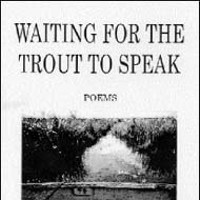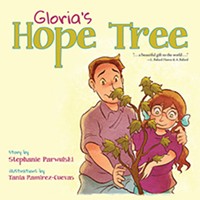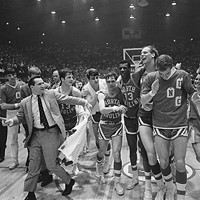Raising the Dead consists of 55 poems, divided equally among five sections. The first and last sections deal with the flooding of the Jocassee Valley in a mountainous area near the South Carolina/North Carolina border. These poems offer an often haunted view of life in the pre-dam valley.
In "A Homestead on the Horsepasture," a resident of the community watches "water tug his farm under/ one row at a time, so slow/his eyes snagged no memory/ of what was lost." "The last panther/ ever to stalk Jocassee" is hunted and shot in "Panther Tree." The highlight of these sections is a long first person narrative called "The Search," in which a group of neighboring farmers go in search of the wife of "the only colored we had ever known" -- "She'd got so old she was lost inside her mind."
Section three of the book pays homage to the memory of the poet's cousin. In the most moving of these poems, the victim's mother and the narrator visit "Reid Hartley's Junkyard" to see the wrecked Ford pickup that carried their relative to his death. When they find the vehicle, the mother "gets in, stares through glass her son/ looked through the last time he knew/ the world. . ." As in many of these poems, the conclusion is startling:
as though believing
like others who come here she
might see something to carry
from this wreckage, as I will
when I look past my aunt's ruined
Sunday dress, torn stockings, find
her right foot pressed to the brake.
The even numbered sections of this volume revisit much of the territory from one of Rash's previous collections, Among the Believers. Most of them are set north of Asheville and the area just north of Blowing Rock. Some of the poems are set as far back as the 1700s while several deal with the impact of the Civil War on these communities. There is a great deal of violence in these poems, but none more so than in "Shelton's Laurel," a narrative epistle to a sister, which describes how he saw "neighbors die like snakes. Gut-shot,/ then hacked with hoes until their moaning ceased." The writer laments that the war had settled "like a vulture in these hills,/ a vulture never sated."
Finally, one can't speak about the work in Raising The Dead without commenting on Rash's mechanical proficiency. Here, he again proves to be the master of the seven-syllable line. He frames much of this verse on an invisible template in which he works a driving rhythm. -- a rhythm he creates through internal rhyme, alliteration, and occasional repetitions. Better yet, Rash has perfected his technical style to the point where it's almost unnoticeable. Add to this a spare, careful diction (one would be hard pressed to find 20 adverbs in this book), and you have a winning poetic formula. Raising the Dead certainly elevates Ron Rash to the upper echelon of practicing American poets. *
Latest in Books
More by Tim Peeler
-

Fishing For Truth
Mar 6, 2002 - More »
Calendar
-
An Evening With Phil Rosenthal Of "Somebody Feed Phil" @ Knight Theater
-
Kountry Wayne: The King Of Hearts Tour @ Ovens Auditorium
-

NEW WINDOW GALLERY-Pat Rhea-ACRYLIC PAINTINGS-April 05-30 2024 VALDESE, NC 28690 @ New Window Gallery/Play It Again Records
- Through April 30, 12 p.m.
-

Trap & Paint + Karaoke @ Zodiac Bar & Grill
-

LIVE MUSIC FRIDAYS!!! @ Elizabeth Parlour Room
-
Susan Brenner Examines Upheaval While Celebrating Trees
Chaos and beauty
-
Jessica Moss Makes the Gantt Center a Safe Zone for Local Artists 2
Flipping the script
-
Breaking the Moon musical brings light to dark side 12
A Teenie Galaxy












